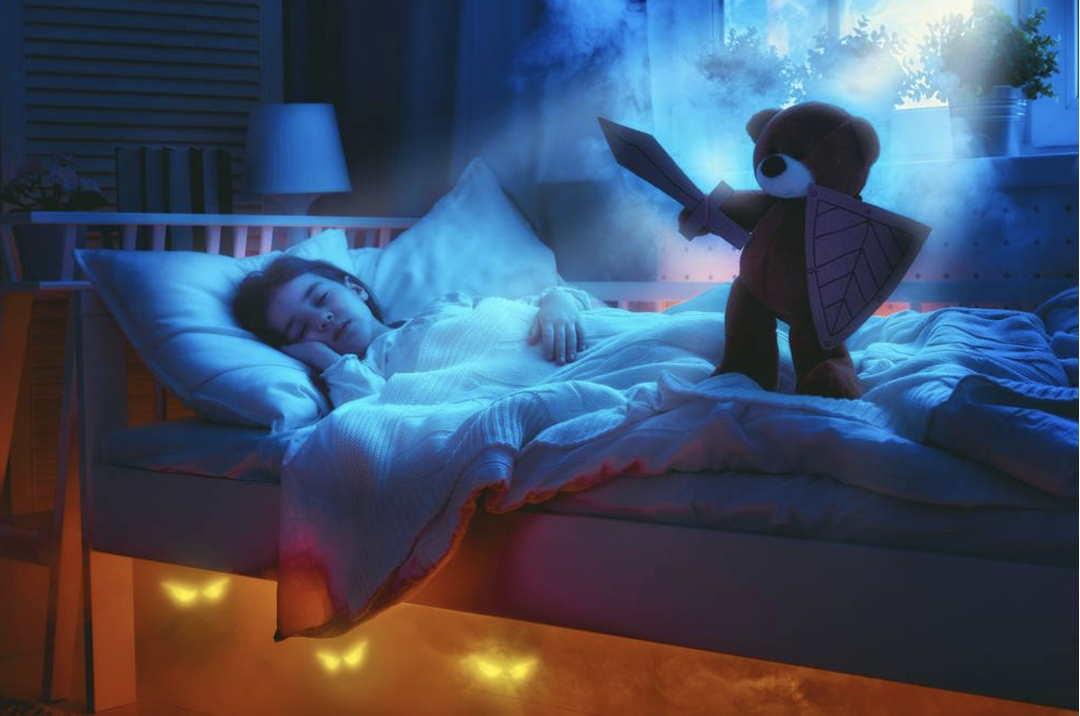For many children, “The Monster Under the Bed” is a familiar yet frightening concept that can make bedtime challenging. This common childhood fear, where children imagine creatures lurking in the dark, often represents the unknown and triggers feelings of vulnerability and anxiety.
Addressing this fear is essential for both children and their parents, as it supports the development of emotional resilience and security. In this article, we’ll provide actionable guidance for parents and caregivers on supporting children through this stage.
Why Do Children Think There Is a Monster Under the Bed?
The ‘Monster Under the Bed’ represents the fear of the unknown, typically manifesting at night when children are alone in their rooms. This fear is often harmless and fleeting, but for some children, it develops into a persistent anxiety known as teraphobia — the fear of imaginary creatures or monsters.
Teraphobia often appears during the toddler and preschool years, coinciding with the development of a child’s imagination and their capacity for abstract thought.
Children experiencing teraphobia may genuinely believe in the presence of monsters under their bed or in their closet, which can lead to bedtime struggles, sleepless nights, and even nightmares. Although it’s a common fear, teraphobia requires careful attention to prevent it from disrupting a child’s sleep patterns and daily life.
Which Factors Can Contribute to This Fear?
The causes of teraphobia are rooted in a child’s natural development and growing understanding of the world. Several factors contribute to this fear, including:
- Imagination development: As children’s imaginations grow, they become more capable of visualizing fantastical creatures, including monsters.
- Exposure to scary stories or images: Media containing scary themes can fuel fears of monsters or the dark.
- Anxiety and separation fears: For many young children, being alone in the dark or separated from their parents is unsettling, heightening fears of imaginary creatures.
How Can You Help Your Child Overcome This Fear?
Helping children confront “The Monster Under the Bed” can empower them to overcome this phobia. Here are some strategies parents can use:
- Acknowledge and validate their feelings:
Let children know their fears are understood and valid. Instead of dismissing their concerns, calmly listen and reassure them that you are there to keep them safe. - Encourage open dialogue:
Allow your child to describe their fears in their own words. Sometimes, simply talking about what the “monster” looks like or why it’s scary can reduce the fear’s power. - Provide reassurance and comfort:
Physical comfort, such as a hug, can be soothing. A bedtime routine that includes a favorite stuffed animal or blanket may also provide a sense of security. - Use imaginative tools:
Consider using a “monster spray” (a bottle of water with a label) or other creative rituals that help your child feel empowered to confront their fears. - Avoid reinforcing the fear:
While it’s okay to acknowledge your child’s feelings, try not to overemphasize the monster’s presence. Avoid making “deals” with the monster or pretending to “fight it,” as this may reinforce its existence in their mind. - Limit scary media:
Avoid exposing your child to frightening stories, movies, or shows, as they can easily lead to anxieties and nightmares.
If The Monster Under the Bed fear becomes overwhelming, it might be beneficial to consult a child psychologist or therapist specializing in childhood anxiety and phobias. While teraphobia can be challenging, understanding its causes, early signs, and strategies for coping can make a meaningful difference in helping children feel secure. Parents play an essential role in helping children navigate this stage with compassion, patience, and encouragement.
For more helpful articles on parenting, child development, and positive parenting strategies, access the Kinedu app. Together, we can support children through the stages of early childhood, empowering them to grow into confident, resilient individuals.








